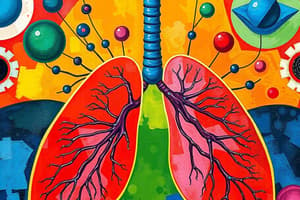Podcast
Questions and Answers
What is the tiniest functional unit of an organism?
What is the tiniest functional unit of an organism?
Cell
What do we call a group of similar cells working together?
What do we call a group of similar cells working together?
Tissue
Define an organ.
Define an organ.
A group of tissues that have been adapted to perform a specific function.
What is an organ system?
What is an organ system?
What are the basic requirements for life? (Select all that apply)
What are the basic requirements for life? (Select all that apply)
All living things need food as a requirement for life.
All living things need food as a requirement for life.
What does MRS GREN stand for?
What does MRS GREN stand for?
Which system in the body helps with communication through chemical messengers?
Which system in the body helps with communication through chemical messengers?
Which of the following is NOT one of the requirements for life?
Which of the following is NOT one of the requirements for life?
Flashcards are hidden until you start studying
Study Notes
Body Systems and the Requirements of Life
- Living organisms are complex, made up of trillions of cells organized into various systems.
- These systems must coordinate their activities for survival.
- The nervous and endocrine systems facilitate communication within the body.
Characteristics of Living Things (MRS GREN)
- Movement: Organisms can change position or move substances within their bodies.
- Reproduction: Organisms create offspring.
- Sensitivity: Organisms respond to stimuli in their environment.
- Growth: Organisms increase in size or complexity.
- Respiration: Organisms release energy from food.
- Excretion: Organisms remove waste products.
- Nutrition: Organisms take in and process nutrients.
Requirements for Life
- Water
- Suitable temperature range (internal and external)
- Nutrients
- Oxygen (or other gas for metabolism)
- Waste removal
- Space
Organ Systems in Multicellular Animals
- Respiratory system: Brings oxygen into the body and removes carbon dioxide.
- Circulatory system: Transports oxygen, waste, nutrients, hormones, heat, etc., throughout the body.
- Digestive system: Breaks down food into absorbable molecules and eliminates waste.
- Nervous system: Detects stimuli, controls bodily functions, and sends electrical messages through the brain, spinal cord, nerves, and sense organs.
- Endocrine system: Regulates body functions using hormones.
- Urinary system: Removes waste from the blood, maintains salt and water balance.
Key Terms
- Cell: The smallest structural and functional unit of an organism.
- Tissue: A group of similar cells working together.
- Organ: A group of tissues adapted to perform a specific function.
- Organ System: A group of organs working together to perform one or more functions.
- Organism: Any living thing composed of one or more cells.
Studying That Suits You
Use AI to generate personalized quizzes and flashcards to suit your learning preferences.




